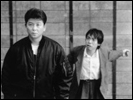Serpent’s Path
- Year
- 1998
- Original title
- Hebi no Michi
- Japanese title
- 蛇の道
- Alternative title
- Ja no Michi
- Director
- Cast
- Running time
- 85 minutes
- Published
- 14 November 2001



by Tom Mes
Serpent's Path forms one half of a duo of straight-to-video yakuza pictures, with which Kiyoshi Kurosawa did the unprecedented thing of remaking a film immediately after finishing it. His motivations had very little to do with creative poverty, but rather with the opportunity to explore the same subject in two decidedly different ways.
Serpent's Path and its companion piece Eyes of the Spider (Kumo no Hitomi) both start from the same premise: a man taking revenge for the murder of a child. Kurosawa used this premise as the jumping-off point for the two films rather than as their definition, resulting in a pair of works which are not so much occupied with revenge, but with the mental processes of human beings in situations that have placed them outside of everyday life.
As Serpent's Path opens we see two men, named Nijima (Kurosawa regular Sho Aikawa) and Miyashita (Teruyuki Kagawa), drive their car to an abandoned warehouse on the edge of town. Out of the trunk they drag a man, who they take with them into the building and chain to a wall. Miyashita is out for revenge against the killers of his eight-year old daughter. Nijima, a schoolteacher by trade, is helping him, though exactly why and how these two men decided to team up remains unclear. They proceed to subtly torment their victim, a low-level yakuza, into a confession. Miyashita, himself a former yakuza, is grief stricken and about to lose his sanity altogether. He laments over a perpetually looping extract of home video footage of his daughter, which is played on a tv set in front of their captive. Nijima on the other hand is calm and collected, his detached air of professionalism keeping Miyashita's smouldering rage at bay.
But the confession they hope for doesn't come. Instead they get the name of another possible culprit who ends up in the same predicament. He in turn gives them the name of another and pretty soon the two avengers find themselves in more trouble than they bargained for and nowhere nearer the identity of the actual murderer.
Written by his frequent collaborator Hiroshi Takahashi (of Ring fame), Serpent's Path is a typical Kiyoshi Kurosawa film; a provocative examination of human psychology built on a generic genre entertainment base. As noted, in this case that base is the revenge film, a genre the director also handled the previous year with another duo of straight-to-video productions, The Revenge: a Visit from Fate (Fukushu - Unmei no Homonsha) and The Revenge II: the Scar That Never Fades (Fukushu - Kienai Shokon) - a duo that plays as rather more traditional sequels.
As opposed to Eyes of the Spider's exploration of the consequences of trauma (also with Aikawa as a character named Nijima in the lead), Serpent's Path appears to be mainly concerned with how human behaviour adapts to new situations, critical or otherwise, either by force or by choice, and how personalities bend themselves to fit that situation. The first hostage gradually learns to adapt to his predicament and soon manifests his old yakuza cockiness again, despite being chained to a wall and lapping food off the floor. When the second yakuza arrives, who is younger than he is, and is chained up beside him, he even attempts to reinstate the hierarchy of seniority.
Nijima himself retains his schoolteacher's air of elevated professionalism throughout the whole sordid affair. He is used to dealing with people being tied to him (albeit sitting behind school desks until the bell rings) and unruly behaviour. The trio of yakuza chained to a wall in the next room might as well be three naughty children on after-school detention. To him, little has fundamentally changed except the environment, and he continues his daily affairs unperturbed. He even arrives at the warehouse by his normal mode of transportation: a bicycle. When he explains his motivations for assisting Miyashita with a curt "I always wanted to try something like this", it offers a momentary look into the dark, hidden depths of Nijima's psyche, his feeling towards his job situation and perhaps even towards his students.
Finally, even Miyashita's grief bends his behaviour and personality rather than changing them. Although he seems to be a man whose feelings of loss have pushed him over the edge, the implication of the film's resolution (which I won't reveal here) suggests that his violent tendencies are not new to him and are in fact not even close to what he's really capable of, which is something far scarier. All in all, the consensus appears to be that no matter which situation we are thrown in, the fundamental nature of an individual doesn't change.
Kurosawa films these proceedings with the cold observational eye so characteristic of his films. It's an approach with which he works miracles. Shooting largely in long, one-take scenes and making wonderful use of space - particularly backgrounds and depth - he coaxes a pair of admirable performances out of his leads Aikawa and Kagawa. Despite the dark overtones of the subject matter, the director allows a lot of room for a dark comedy that borders on the absurdist. The scene in which they snatch their second victim from a golf course from under the noses of his colleagues is a terrific example: as they run across immaculately green hills, dragging the unconscious yakuza behind them in a body bag while the bullets fly past their heads, the viewer is not sure whether to laugh out loud or gape in astonishment.
As always, Kurosawa avoids serving up easy-to-digest morsels of emotion. He is not so much interested in the emotions themselves, but rather in the mental process that precedes them, often leaving characters stranded in a medium state between an event and the emotion that results from it. Subsequently he aims for the mind more than for the heart, but to say that his films are cold and emotionless is missing the point. Kurosawa always deals with themes and subjects which are intrinsically human. He certainly doesn't make things easy for his audience, but this often results in a very challenging and rewarding experience. And Serpent's Path is as challenging and rewarding, not to mention gripping, as anything he has made.